What If I Catch
My Puppy in the Act?
When “Positive” Methods Fail
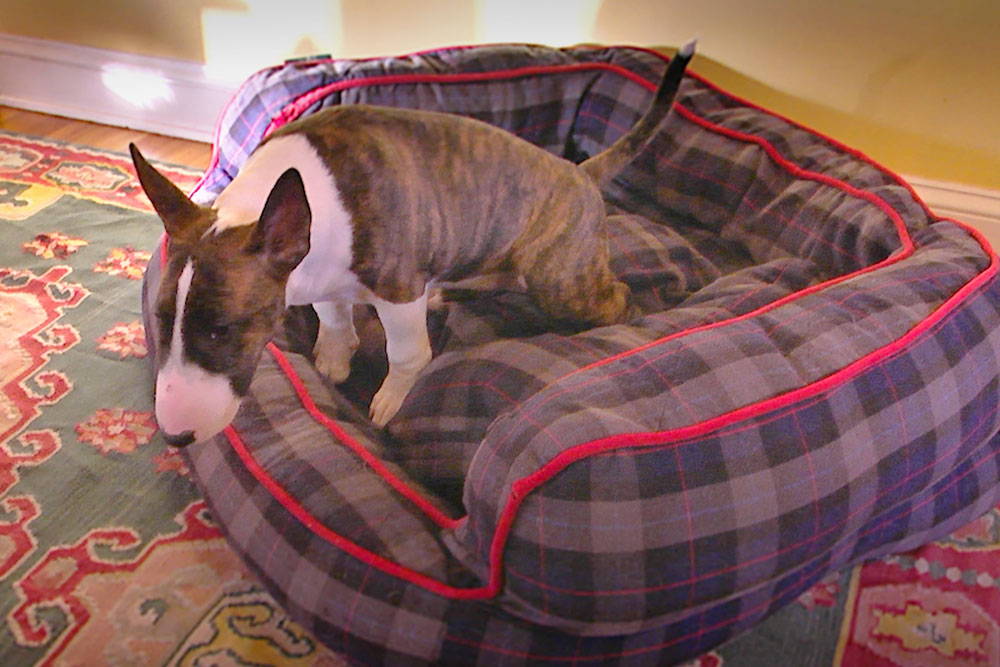
Every dog trainer I know has gotten this question not once, but a thousand times:
Yes, I get it, I’m not supposed to punish my puppy for going to the bathroom in the house. But what if I catch him in the act? If we’re not supposed to correct or yell at the puppy, what ARE we supposed to do?
I’m going to answer this question, but then I’m going to address what people are really asking, which is, “What do you do when “positive” methods fail?”
Don’t Make It Worse
First, in direct answer to the question, let your puppy finish going to the bathroom. Unless he is voiding on something that is precious and irreplaceable do not try to lift and move him outside. It’s not teaching the puppy anything, and you run the risk of scaring the puppy so he’s afraid to go to the bathroom in front of you.
And, as we discuss in Puppy Culture, if your puppy is afraid to void in front of you, he won’t do his business when you take him outside and will instead wait until he’s back in the house. He’ll find a safe place to hide from you, like behind the couch, and go there. Not a good outcome. So let him finish, clean it up, and take stock of the situation.
Circumstantial Evidence
Look at the circumstances that preceded the voiding in the house. How long has it been since he was out last? Did he just eat or drink? Did he just have a play session? Did he just wake up from a nap? Do you see a consistent set of circumstances that predicts that your puppy will void in the house?
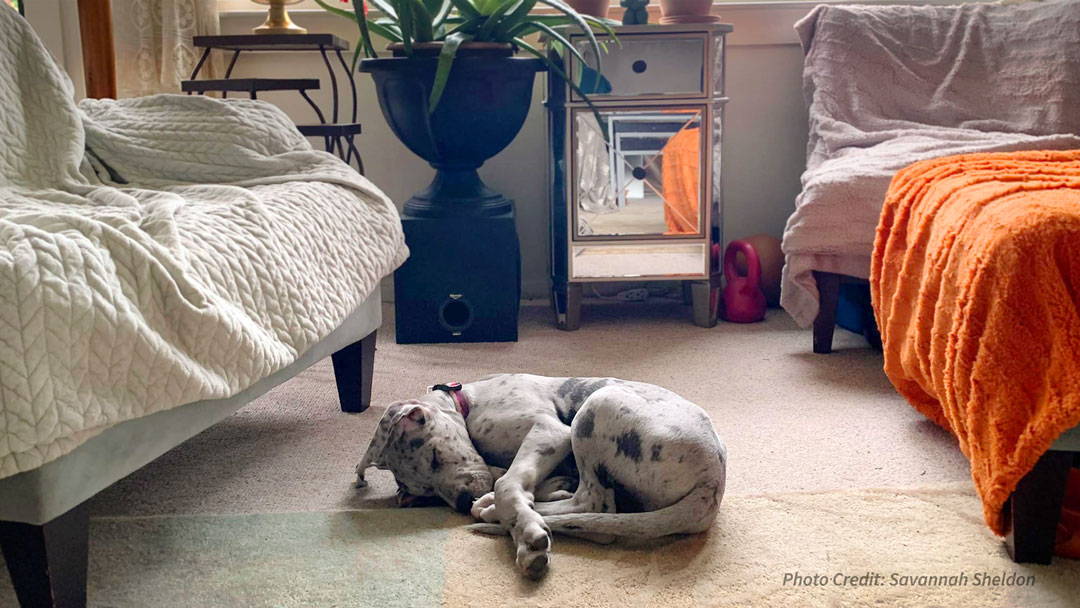
You can safely bet that your puppy will need to eliminate as soon as he wakes up. And if you walk into a room where the puppy is sleeping, there’s a good chance he will wake up. Have your shoes and coat on, leash in hand (if applicable) and be ready to take him outside immediately!
If you are consistently seeing that he voids at the 45-minute mark since his last void, take him out at the 30-minute mark. If you see that he is predictably voiding 10 minutes after waking up, take him out 8 minutes after waking up, even if you already took him out. If you see he predictably voids as soon as you let another dog into the room, don’t let another dog into the room. Take them both outside, first.
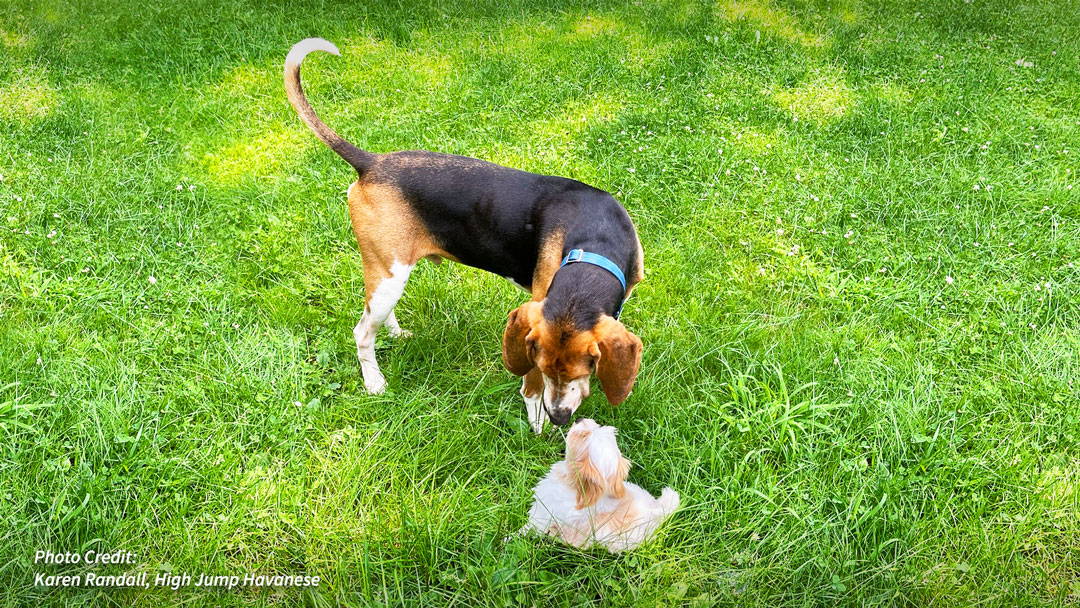
If you let an adult dog into the room inside your house where your puppy is, your puppy will almost certainly be excited enough to pee within seconds. If the puppy is inside the house, that pee is going to be on the floor – fail! But if you let the adult dog outside first and then bring the puppy outside with the adult dog, the puppy will instead pee outside PLUS see the adult dog voiding outside so the puppy can begin to model his behavior on the adult – double win!
These are just examples, try to pay close attention to all the details and record them. You might be surprised at how consistent the circumstances of “failure” are!
Are You Listening?
While circumstances can help you predict when your puppy might have to go, sometimes the puppy himself is telling you exactly when he has to go. Did you miss one of these “tells?” Did he sniff at the door, suddenly break off playing, or run to a favorite elimination spot? Take note and react immediately next time!
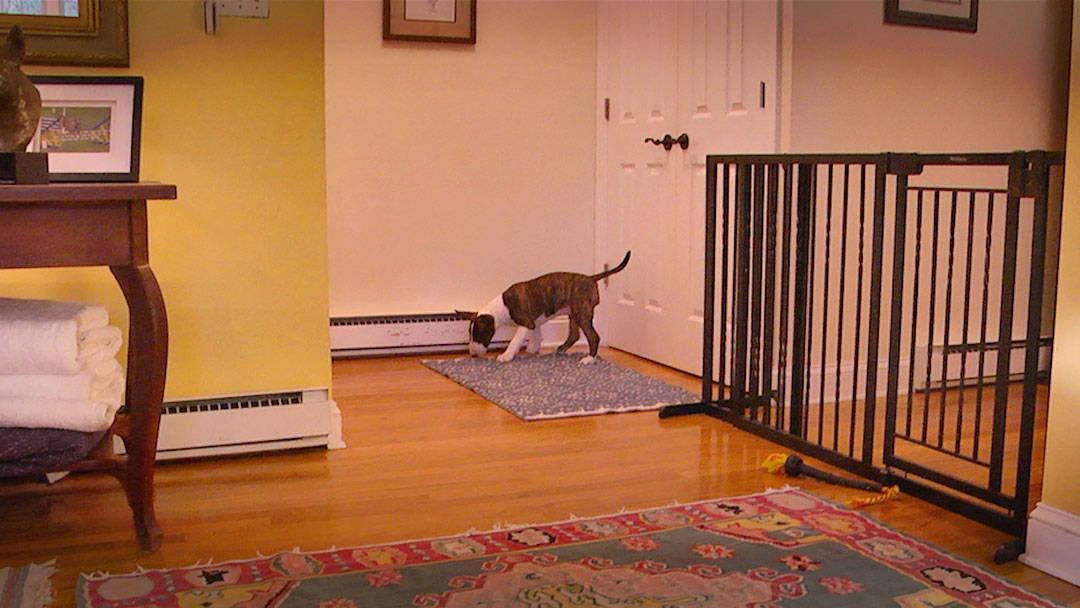
Quick sniff near the door is a clear indicator that your puppy has to go. It’s usually super clear but also very easy to miss because it happens very suddenly and quickly. If you are distracted for ten seconds you can easily miss it. Don’t expect perfection from yourself any more than you expect perfection from your puppy. You can’t literally watch your puppy all the time. Sometimes you’ll miss it, there will be accidents, and that’s OK.
You’re not Perfect, Puppies Aren’t Perfect, and That’s OK.
This is THE MOST IMPORTANT thing of all. Embrace the fact that there will be some poop and pee on the floor when you have a puppy.
It’s not realistic to think you can literally watch your puppy every second of the day. You’re going to miss a sign that your puppy needs to go outside, you’re going to forget when you took him out last, someone’s going to let an adult dog into the room where the puppy is. Don’t beat yourself up over this. If you do get it right most of the time, your puppy will learn soon enough.
And, even if you were perfect and literally watched your puppy like a security camera, it’s not always that you missed the signs or did not take the puppy out often enough. Sometimes it just happens. Housetraining is a developmental process. Puppies are not able to hold it reliably and do not always realize when they need to go until it’s too late. Punishing them for something they can’t control is counterproductive. There will be some poop and pee on the floor along the way, no matter what you do, and that’s OK.
Double-Header
For instance, it’s totally normal that a puppy will poop and pee outside and then come inside and poop and pee again. Double and triple pooping and peeing are part of a developmental phase and one of the behavioral markers we use in our house and crate training system. The puppy will develop control over his bladder and bowels when he is developmentally able to. There is no training that is going to change this and you will not serve yourself or your puppy well if you obsess about it.
If you know your puppy to be a double or triple poop or pee-er, either stay out with him until he’s gone more than once, or take him out multiple times in succession. It takes a while for the involuntary muscles that control his bladder and bowels to mature enough so that your puppy can completely void all at once. This is normal.
Don’t Take it Personally
Sometimes there is a psychological reason why puppies void in the house, but it’s never “spite.” Puppies can be afraid of the dark, they don’t love going out in the rain, some get cold in the winter months. I would not be surprised or upset if one of my puppies failed to void outside under any of those conditions.
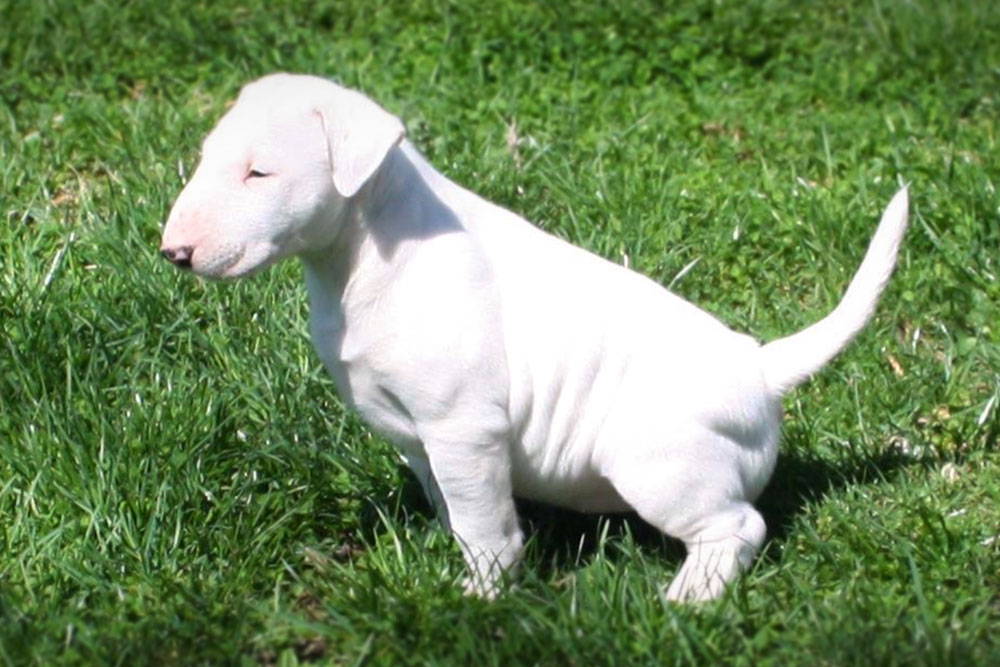
Puppies usually are fine going outside on a warm, sunny day but will stand there and shiver on a cold, rainy, windy night and often will refuse to eliminate under those conditions. It’s normal, they will grow out of it.
They’re babies, and it’s OK to treat them like babies. I hope we would not hit or scold a two-year-old human child for having an “accident” and the same holds true for a puppy.
Sidebar on “Punishment”
There is a substantial body of research documenting the fallout and negative outcomes of using punishment, corrections, and aversive training on puppies. That is a big topic and beyond the scope of this article. I have included a few resources at the end of this article and we cover the topic in depth in Puppy Culture and our Puppy Course so please check those resources for further understanding of why punishment is not recommended for puppies.
To Sum It Up
So, have enzymatic cleaner and paper towels at the ready any time you have your puppy out with you. When you catch your puppy “in the act” let him finish. Then congratulate yourself on being so clever and prepared, and clean it up right away.
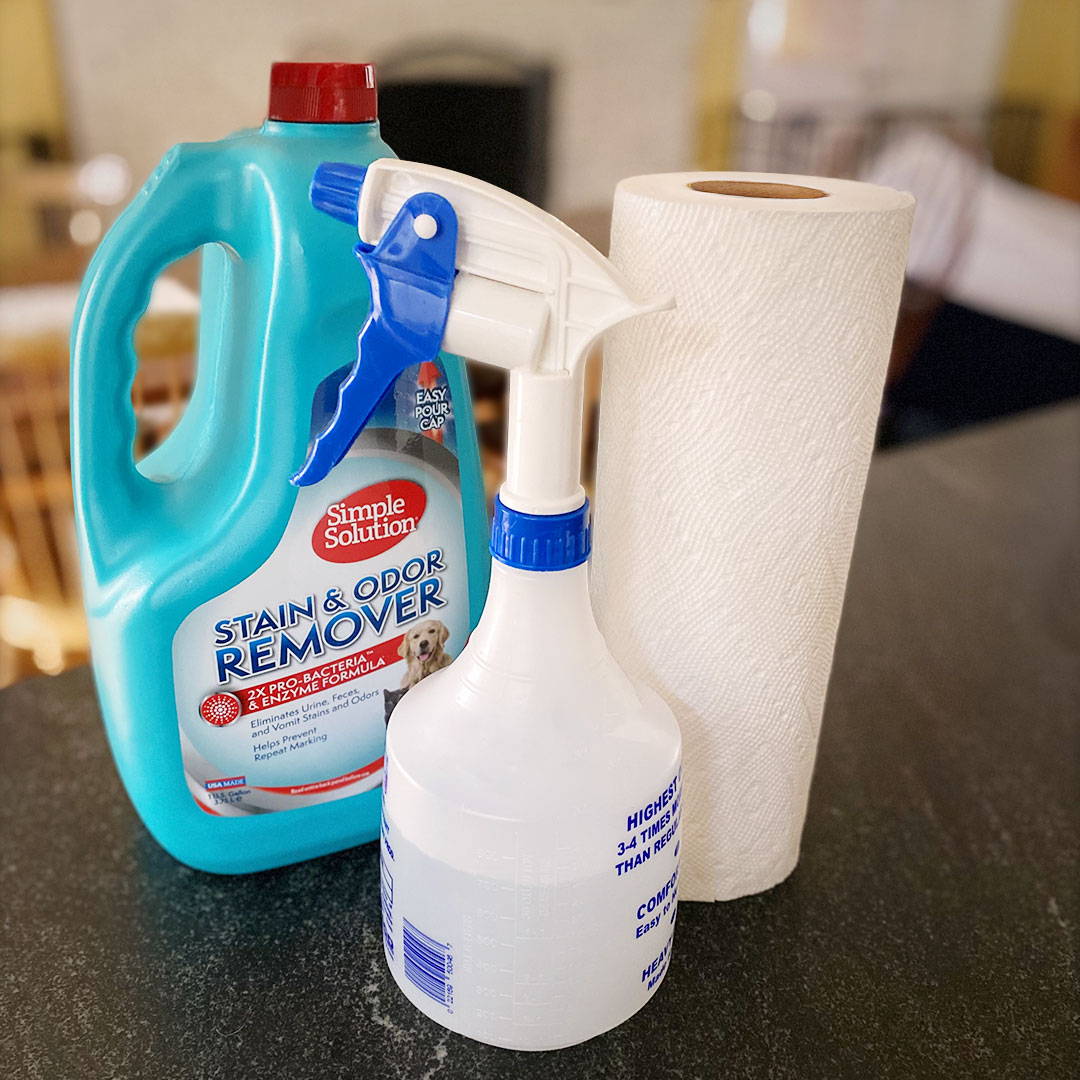
We have tried many enzymatic cleaners and we find Simple Solution to be the most effective. We put it in a sprayer and have it ready on our counter for clean-up (NOT for spraying the puppy!!!!). We use heavy duty sprayers – this one is called “Professional Horse Sprayer” and we got it at Tractor Supply. Any equine supplier will have good heavy-duty sprayers.
That Was Not Satisfying
The advice I just gave is not in any way ground-breaking. It’s standard advice and an internet search is going to return 10,000 hits with that exact advice. Yet, somehow, pet owners are rarely satisfied with that answer. Why is that?
I think it’s because they are really asking a different question. The real and deeper question which is contained within the question is, what do you do when “positive” methods fail? What do you do when you’ve done everything by the book, positive, good management, but the puppy still (pees, bites, ignores you…fill in the blank). Don’t we need to communicate to the puppy that he’s “wrong” with some kind of punishment?
And my answer always is, if you find yourself reaching for punishment, examine your expectations. You can tattoo that on your back, if you like.
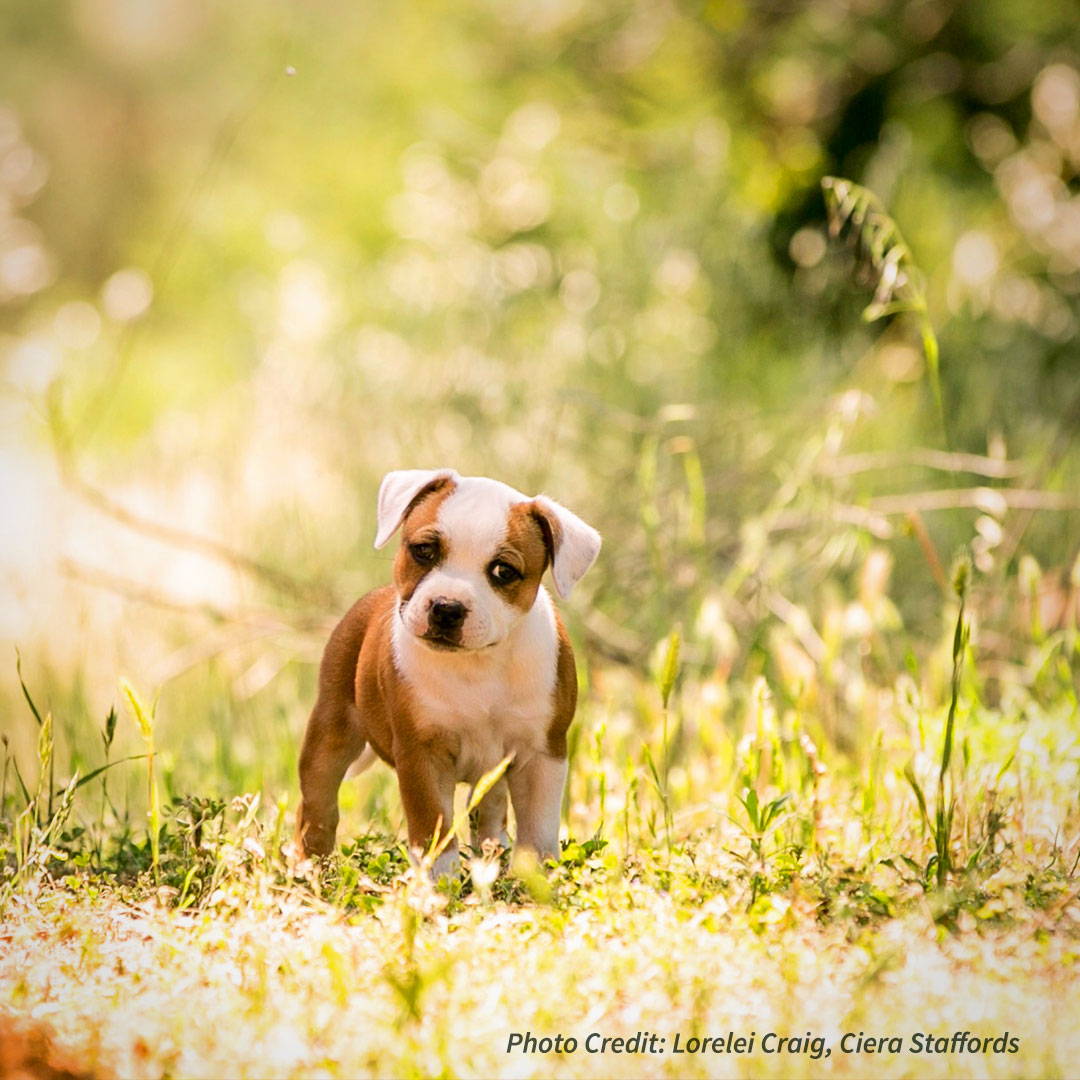
If you are thinking that the only possible way a situation could work is if you use punishment or aversion or even mild corrections, if there truly is no way you can think of that reinforcement could get you the results you desire, look two steps back and try to set up things differently so the scenario never arises.
If you live next to a highway and your dog runs off leash and there is no way to keep him from running into the road and getting hit by a car other than a shock collar, look at your expectations. Running off leash in an unfenced area next to a highway is not a reasonable expectation. Use a leash or get a fence.
If your dog chews up and or breaks the delicate items you place on a low coffee table, move the items.
If you “catch” your dog voiding in the house, take your lumps. You are not going to fix the fail now. The fail happened when the puppy was inside the house at the time he had to go.
You may or may not have had control over the fail, but it’s important to realize that expecting no accidents from a puppy is not a reasonable expectation. The reason you feel compelled to reach for punishment or “instruct” the puppy is that you are assuming it’s wrong. It’s not wrong, it’s a right and natural part of the process. It’s your expectation that’s wrong.
Growing Expectations
I think a lot of problems are caused by people believing that “consistency” means expecting adult behaviors from a puppy and never allowing less because that might “confuse” the puppy. That is simply not true. Your expectations should change and evolve as the puppy grows up… so your expectations at 8 weeks old should be totally different from your expectations at 10 months old.
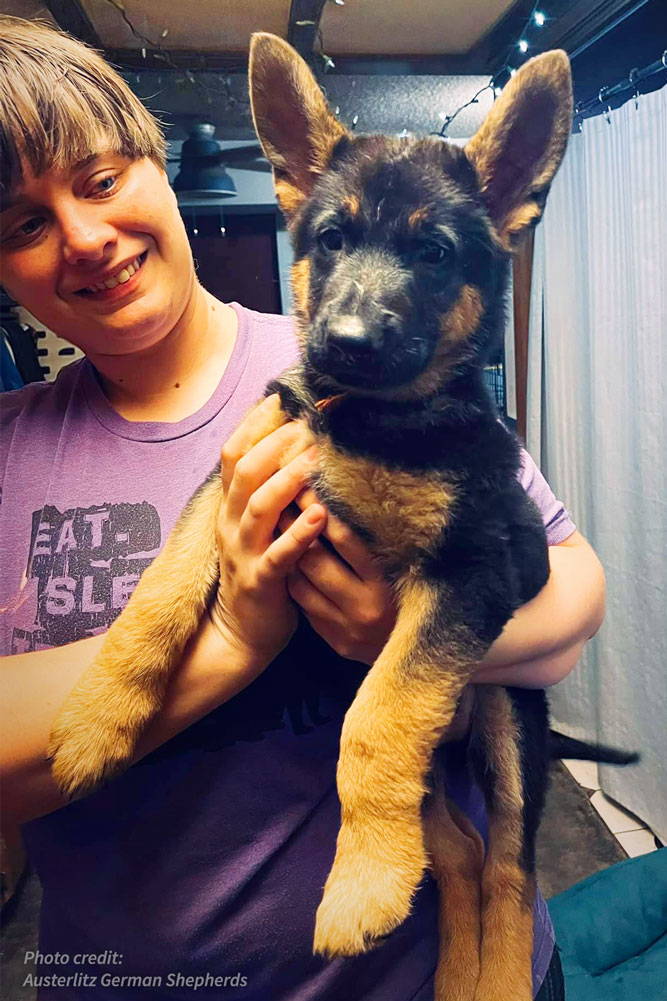
It’s a baby, and it’s OK to treat them like babies. They will learn as they grow.
It’s a process, and you step through it, using behavioral markers to tell you when to move to the next step. We go over this in detail in our house and crate training system (you can sign up for the course, here) but suffice it to say that you will in no way “spoil” your puppy by meeting him where he is developmentally and allowing for some error in the process.
In Conclusion
So, what this all comes back to is examine your expectations, examine them continually, especially when you’re reaching for punishment. Trust me, as a person who raises the most destructive dogs in the world, I feel your pain but at the end of the day there’s almost always another day and another way that strengthens rather than weakens the bond you have with your dog!

For further reading and citations to the studies and findings mentioned in this article:
American Veterinary Society of Animal Behavior Position Statement on Humane Training Methods
American Veterinary Society of Animal Behavior Position Statement on the Use of Punishment
Schilder, M. B., & van der Borg, J. A. (2004):
Training dogs with help of the shock collar: short and long term behavioural effects
Available at: www.sciencedirect.com
Herron, M. E., Shofer, F. S., & Reisner, I. R. (2009):
Survey of the use and outcome of confrontational and non-confrontational training methods in client-owned dogs showing undesired behaviors
Available at: www.sciencedirect.com
Blackwell, E. J., Twells, C., Seawright, A., & Casey, R. A. (2008):
The relationship between training methods and the occurrence of behavior problems, as reported by owners, in a population of domestic dogs
Available at: www.sciencedirect.com
Hiby, E. F., Rooney, N. J., & Bradshaw, J. W. S. (2004):
Dog training methods: Their use, effectiveness and interaction with behaviour and welfare
Available at: www.researchgate.net
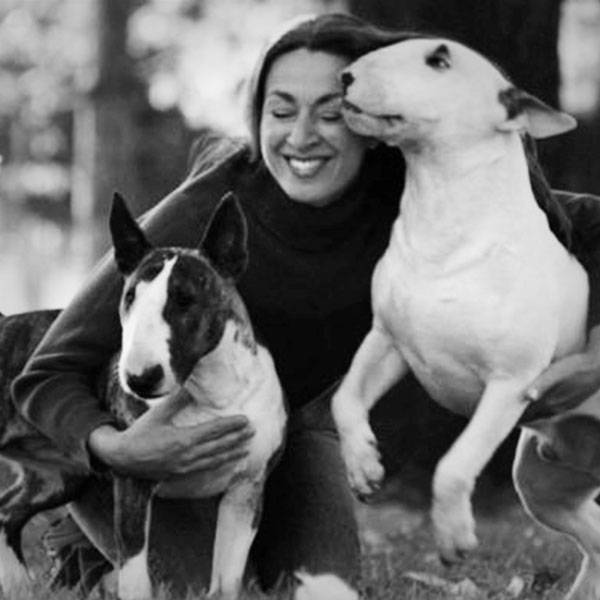
About the Author
Jane Messineo Lindquist (Killion) is the director of "Puppy Culture the Powerful First Twelve Weeks That Can Shape Your Puppies' Future" as well as the author of "When Pigs Fly: Training Success With Impossible Dogs" and founder of Madcap University.
Jane has had Bull Terriers since 1982 and she and her husband, Mark Lindquist, breed Bull Terriers under the Madcap kennel name.
Her interests include dog shows, dog agility, gardening, and any cocktail that involves an infused simple syrup.

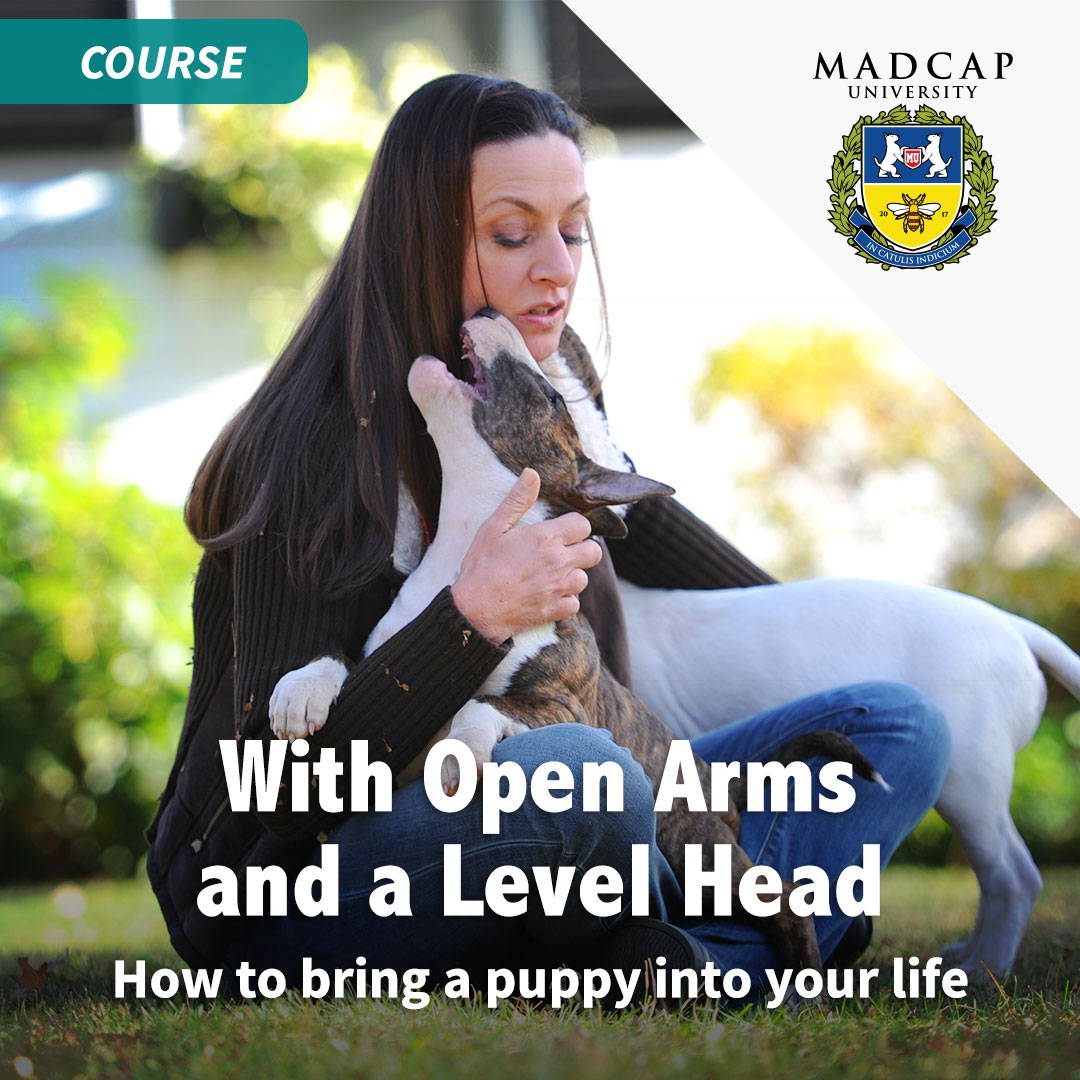
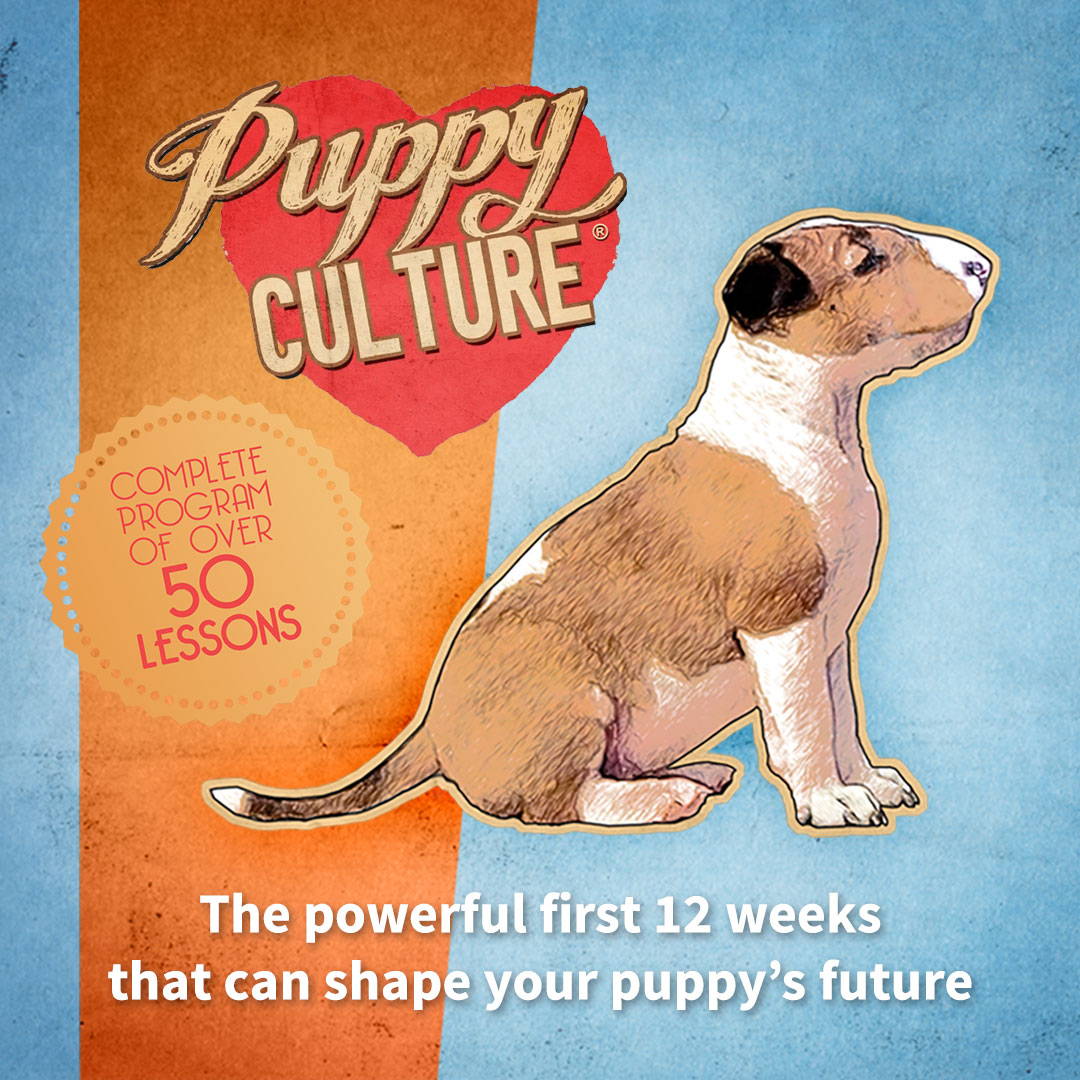
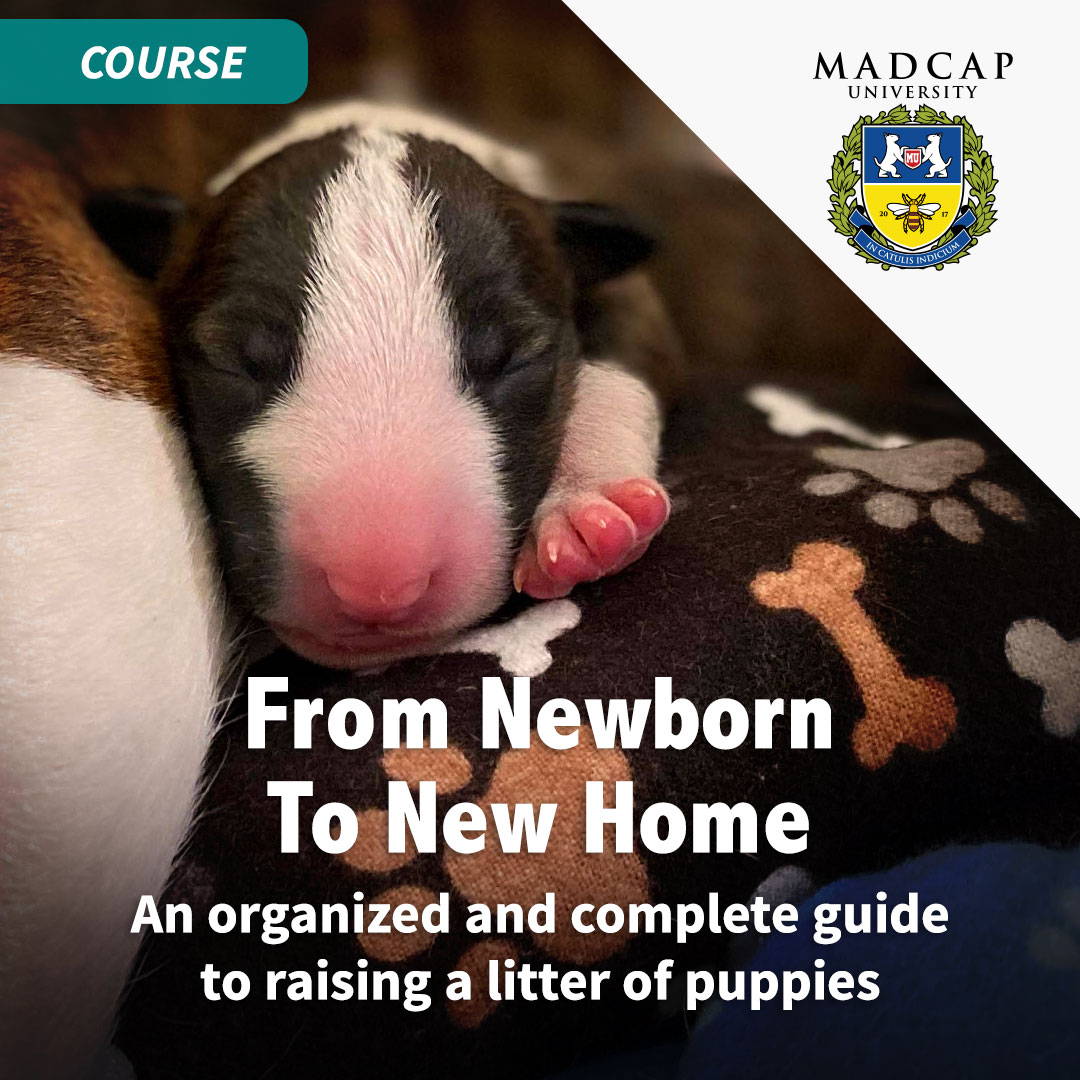
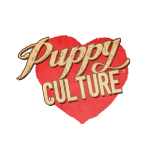

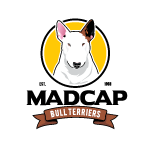
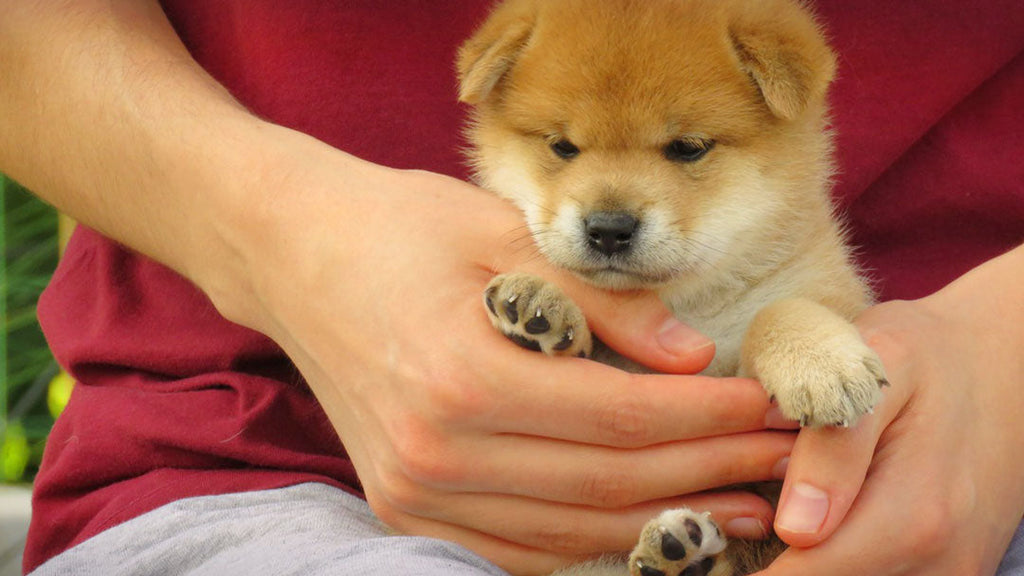
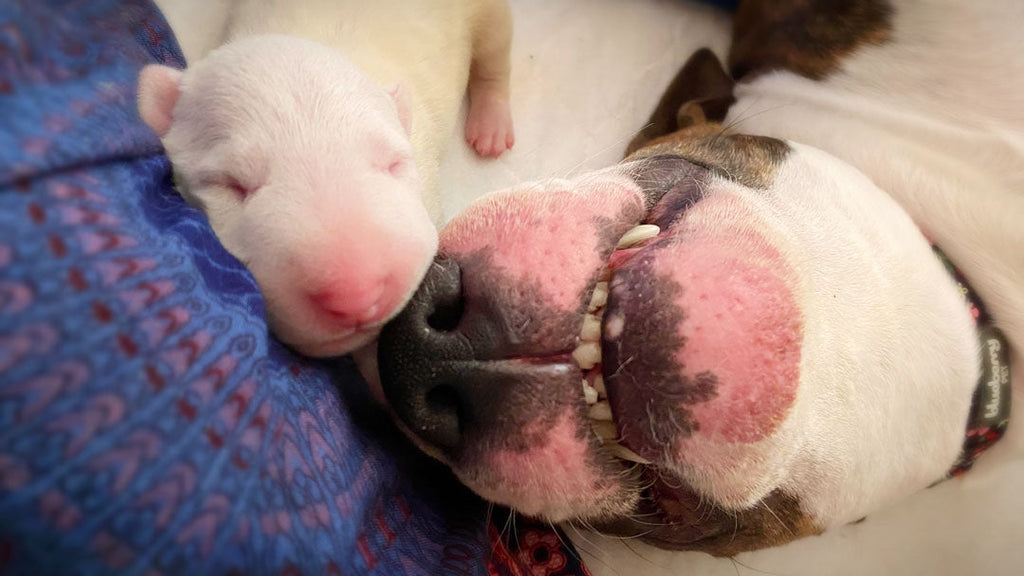
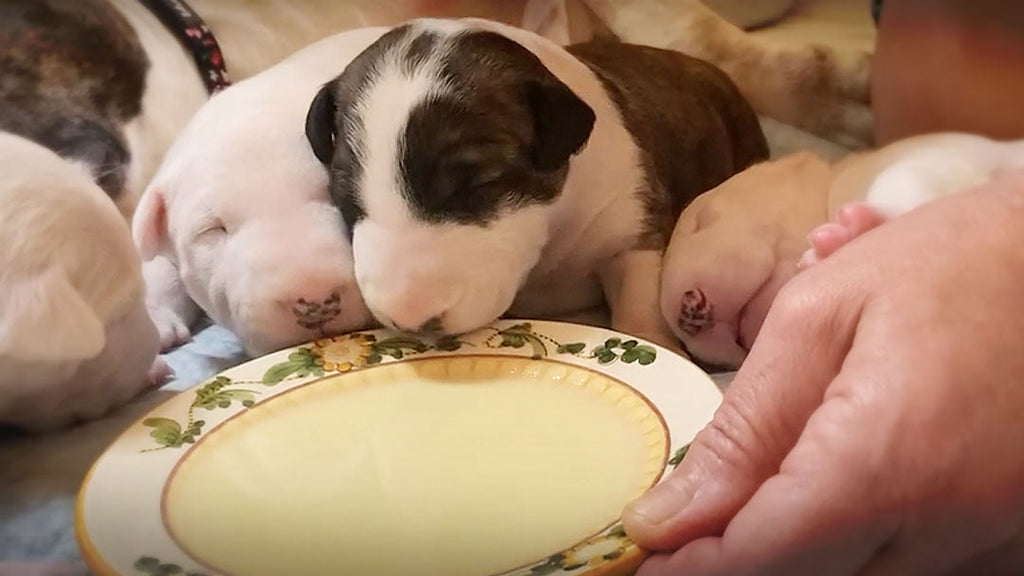
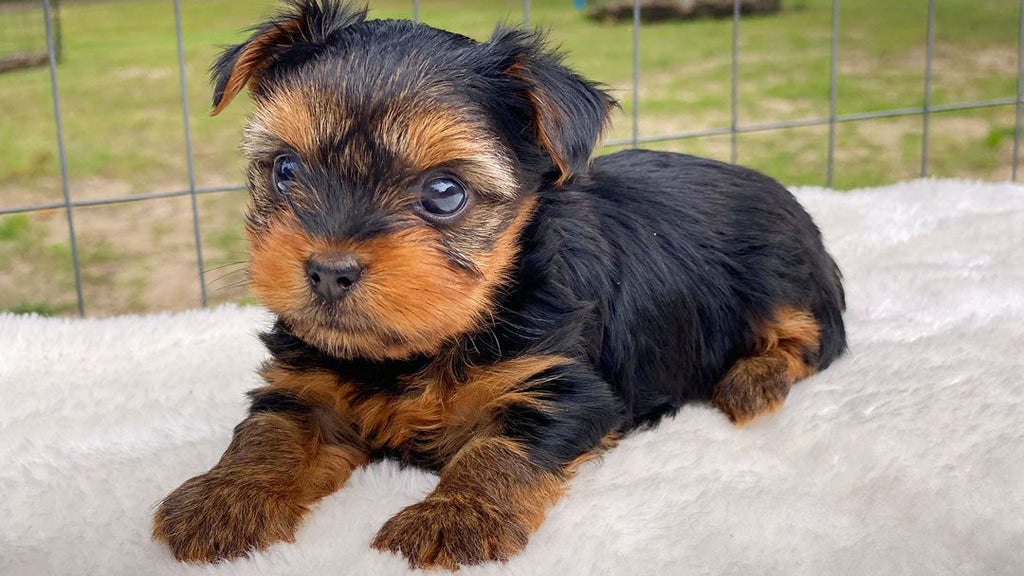
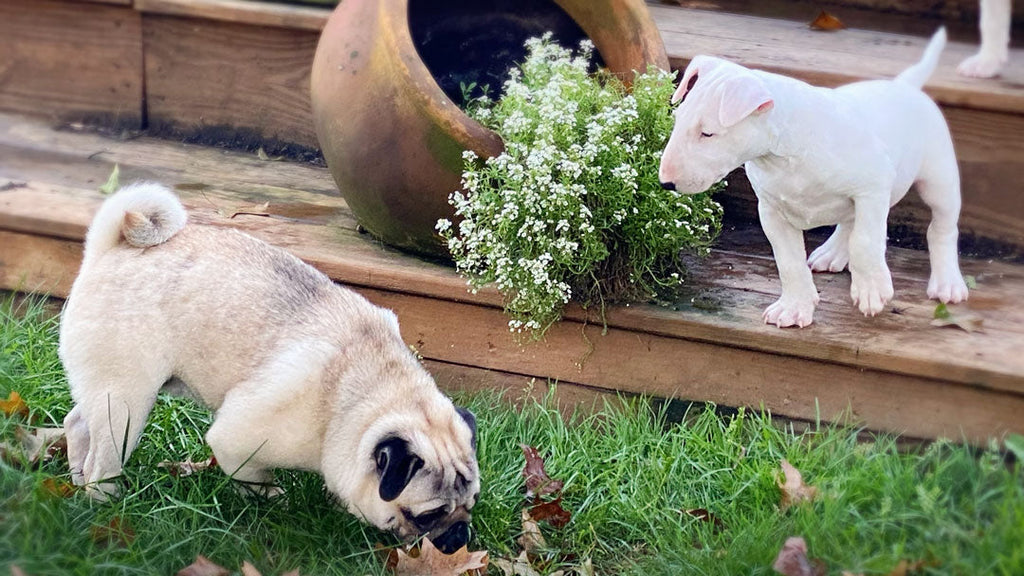
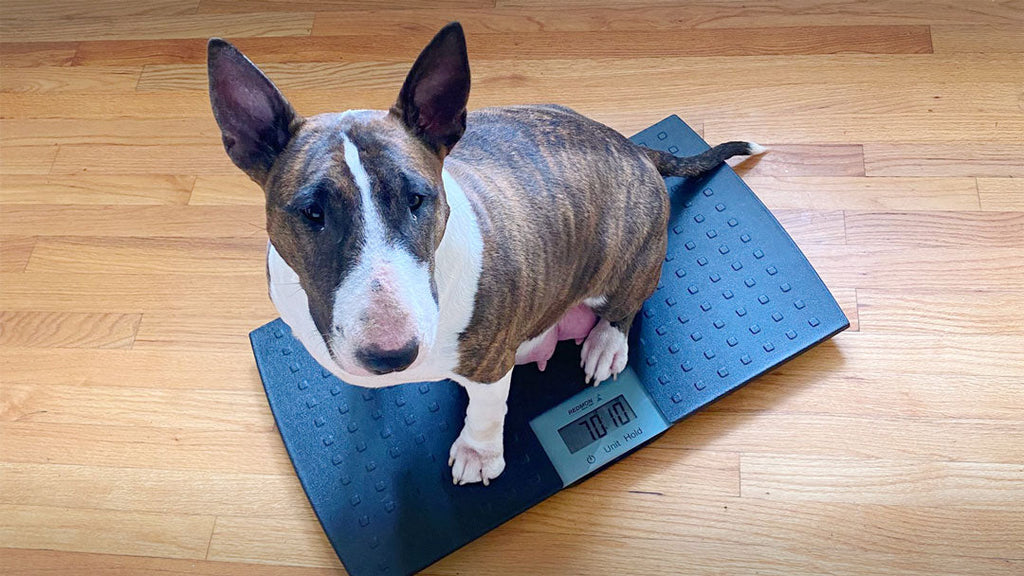

1 comment
An excellent article, thank you, especially the bit at the end about expectations. I actually think the expectation part cuts both ways, we can also have unrealistic expectations of ourselves. I expected that I could mange my pup’s elimination 100% and felt guilty that I caused her to have some ‘accidents’ even though it was only on 6 occasions.